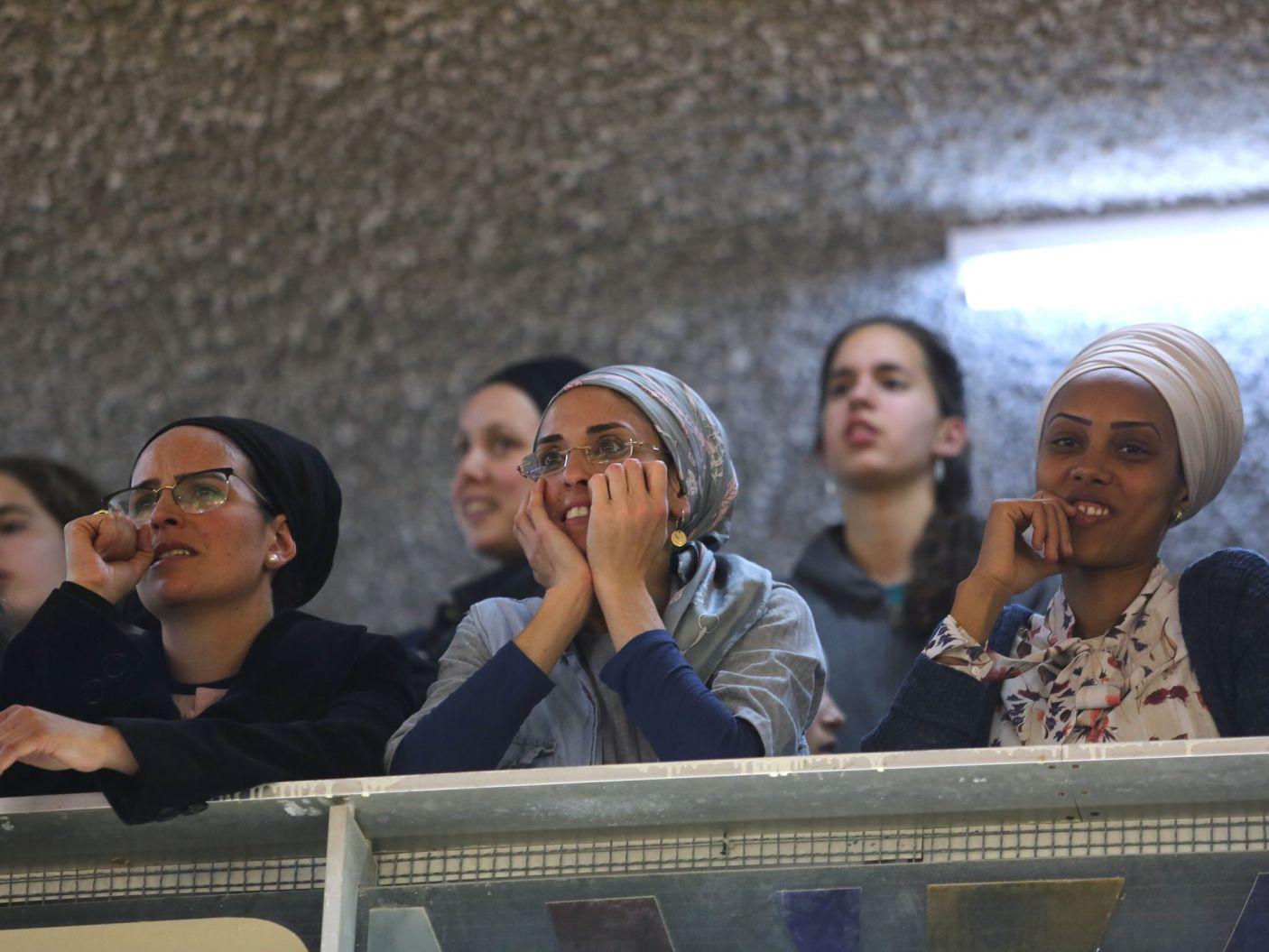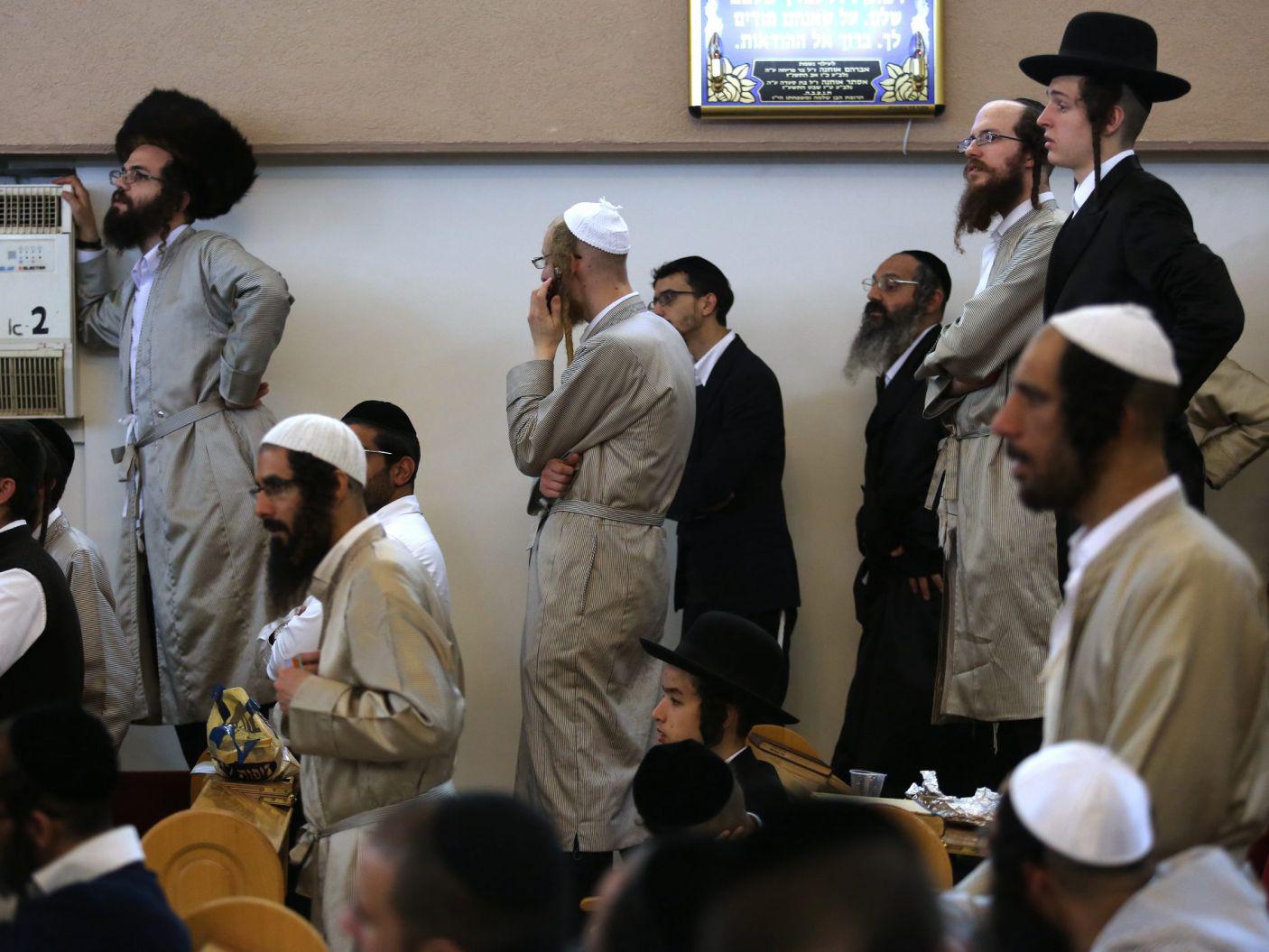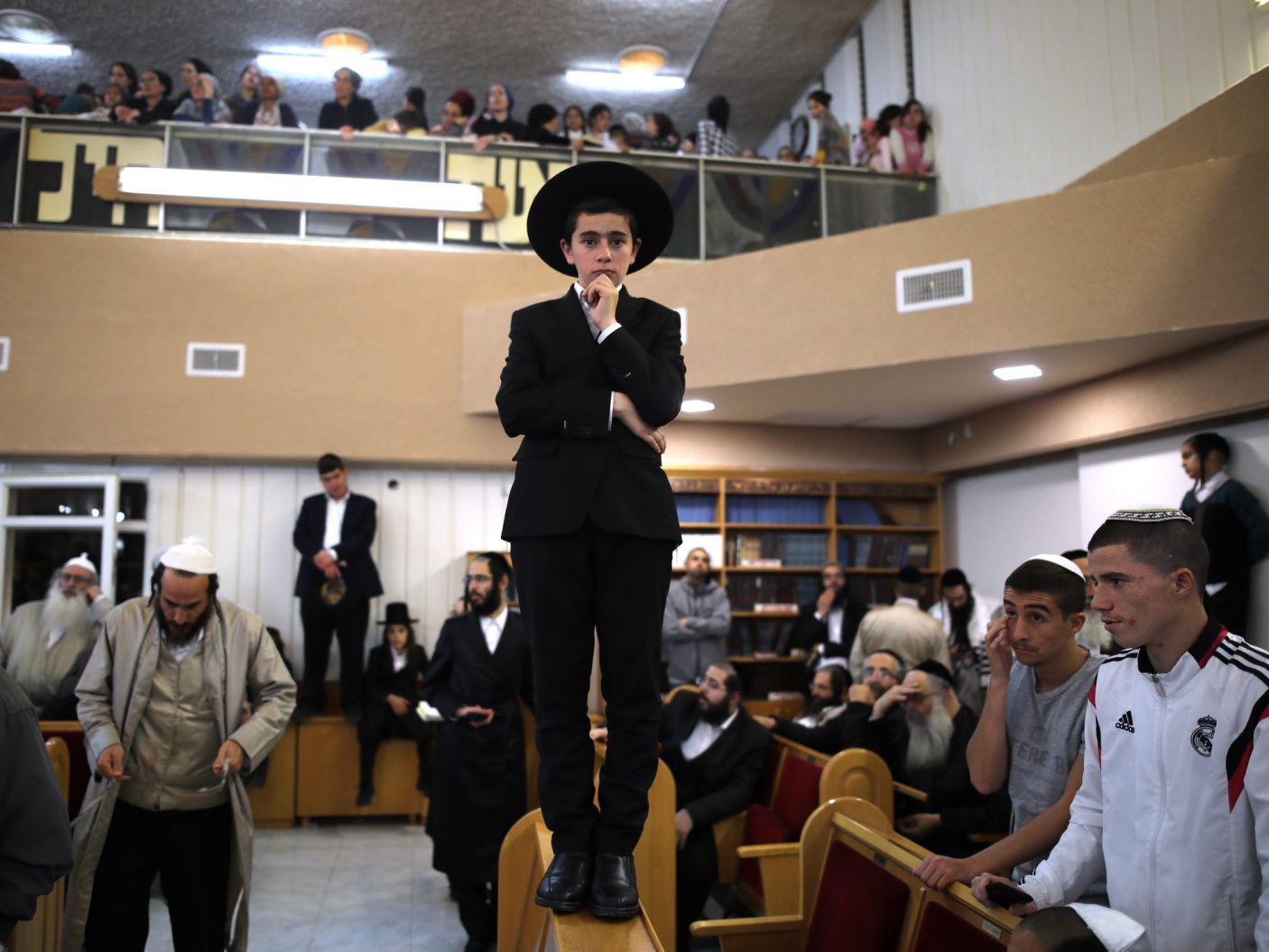|
'God on Earth': Followers of Hasidic Rabbi Convicted of Sexual Assault Hail His 'Superhuman Powers'
By Aaron Rabinowitz
If anyone had thought that once he was released from prison, Rabbi Eliezer Berland would remain alone, unforgiven for the acts he had confessed to and bereft of followers, they were very wrong The invitation to the event explicitly states it will start at 9 P.M. But the hundreds of people gathered in the hall in the southern city of Kiryat Gat, during one of the intermediate days of the Passover holiday, were to endure a long wait. Only when the clock struck midnight did the music heralding the arrival of the star go off. The “Holy Man” (Tzadik), the term used by Bratslav Hasidim for their rebbe, none other than Rabbi Eliezer Berland, had arrived. The excitement hit its peak. One of the followers ran to him and managed to touch the rabbi’s tallit (prayer shawl). The rest of the men pushed and shoved, climbed on chairs and even trampled those standing in the way between them and Berland. The few who succeeded returned to their seats beaming with excitement and with glazed eyes. A similar excitement could be seen looking up to the women’s section. A full year has passed since Berland, the leader of the Shuvu Banim Hasidic sect, was released from prison. He had served a year of his 18-month sentence for sexual assault and indecent acts against two women before being released on parole – and returned to his eagerly awaiting flock of followers. If anyone had thought that once released from prison, Berland would remain alone, unforgiven for the acts he had confessed to and bereft of followers – they were very wrong. Haaretz has followed Berland over the past few months through a series of appearances all over the country, and witnessed how quite the opposite is the case. Some of his supporters did abandon him, did not forgive him, but the majority of his captive audience, his hard-core devotees, still remains. “God can be incarnated in a human being, in the form of the tzadik,” one of his followers explained to Haaretz. This is a mantra for his most dedicated followers who see the rabbi as God incarnated, and state he is allowed to do anything. The audience in Kiryat Gat is not very different that the audience in Bat Yam or Jerusalem. Most of them are the same familiar faces: A few hundred families who live near Berland in Jerusalem and participate in the prayers and classes he gives – and follow him everywhere. Another few hundred families are estimated to be part of his outer circle, but not much more than that. In general, the ultra-Orthodox community decries Berland – even if not publically – and most rabbis of the Bratslav community harshly came out against him after an internal private Hasidic court investigated the claims he was accused of and reached the conclusion that they were true. Nonetheless, his community of followers still remains and the question is why they are still faithful to someone convicted not only of crimes, but of acts that violate the rules of Jewish law. His conduct would have no doubt led to the abandonment en mass of the rabbi and his excommunication in other Haredi communities. “The rabbi didn’t do any of the things they say about him,” one of the women who attended the event in Bat Yam told Haaretz, after she received permission from her husband to speak. “The rabbi is a supremely righteous man, whatever he does is all for the good of the heavens.” The woman's view is not an isolated view. “If people tell me that cats and elephants are dancing now outside, of course I will think they are crazy,” says Yaakov Salma, one of Berland’s students. “This is exactly what I think when all sorts of people tell stories about the rabbi. It simply cannot be. Not possible.” While outwardly Berland’s followers often present a sweeping denial, “internally they talk differently,” says Rabbi Yom Tov Heshin, possibly Berland’s greatest opponent, and who was once one of his confidants before the scandal broke. “They claim that he is allowed, he is God.” Heshin, who seems to be the most hated person in the Shuvu Banim community – and who was behind the exposure of Berland’s acts – turns the spotlight on the complexity of Berland’s defense, which often contradicts itself. This is how, alongside those who say he never committed wrongs, some other followers claim he asked the women who suffered from his assaults to make up their stories for a higher purpose. “The rabbi paid those women to slander him with the goal of taking on himself these disgraces to atone for the people of Israel,” said one of his followers. “You simply do not understand what is going on here. There are heavenly things that we are not capable of understanding,” he added. Alongside the assault charges Berland served his prison sentence for, Haaretz has also obtained recordings from a few years ago where he incites to violence, rather than to the study of the Torah. The recordings also seem at odds with the purported sanctity of the character. Berland declined to comment on the matter following a request from Haaretz. “You have a cursed sinful daughter,” Berland is heard telling the father of a woman who talked back to Berland’s wife. “The next time I see her I will give her two slaps in front of everyone. You need to beat her in public.” In another case, he can be heard raising his voice, and even screaming, at one of his followers concerning appointments in the community’s institutions. “I didn’t appoint them. They’re fired. I’ll shoot them. Bring me a pistol, I’ll shoot them. I’ll murder you too. If you didn’t understand that I’ll shoot you. I’ll serve a life sentence.” In another recording, Berland says about one of his opponents: “We need to deal with him. Either he receives a beating so he will have to flee from Israel. As far as I’m concerned let him flee. I’m going to sentence him to death now. I’m saying now that it is permitted to murder him. You can go file a complaint with the police.” While none of his followers acted according to his orders, it also seems they did not judge him harshly for his aggressive comments. They definitely did not do it openly. It is enough to watch his daily routine to see the scope of admiration and the devotion he enjoys in his community: When he leaves home, dozens of his supporters rush after him in their cars. When he leaves for events, they chase after him too. During Sabbath services he often throws slips of paper, newsletters and spices at his followers – and the crowds fight and shove to have the honor of catching them, or just touching things that the rabbi has touched. The children present at such events hang on the railings, packed in tightly, even climbing over the heads of those praying to receive a white kippa from the Tzadik. Evening prayers are children’s time, when a few of them come onto the podium and receive the rabbi’s full attention while he turns his back on the congregation. The industry for the veneration of Berland can be seen not only during mass events, but also in the stories of miracles and wonders that the followers attribute to him. “I entered Nablus [in the West Bank] at the rabbi’s orders,” tells one of his followers. “Terrorists shot at me from close range and nothing happened to me.” Another devotee described an incident that happened in Ukraine. “We went to immerse in a frozen river. The rabbi entered first and did not come out. After a few minutes we turned around and saw him come out of the ground.” Sometimes the stories raise questions well beyond that of whether they really happened. “One of the members of the community in Holon had a police investigation for driving without a license. The rabbi told him to bring 5,000 shekels ($1,410) and the case would be closed. It’s a crime to tell about it, but it’s what happened,” said another of the Hasidim. His followers like to tell about medical miracles too. One of them described a case in which a member of the community took a glass of water that Berland had drunk from and brought it to his sick daughter, who was healed immediately. His superhuman powers, say his followers, have not diminished despite his advanced age of 80. “He can pray and study while standing for many straight hours without getting tired,” says one of those close to him. “Have we ever seen such things?” Superhuman and miracle maker? No wonder Berland is treated like a God in flesh and bones. In addition to the stories about him, it seems Berland himself has contributed quite a lot to building his image. In recordings made during his classes obtained by Haaretz, Berland can be heard glorifying himself. “The Tzadik is not a man at all,” he can be heard saying. “He is the Holy One, blessed be He, in all his glory, who comes down in the form of man. So he can do everything in the world – to atone for all sins, to bring to repentance.” The Tzadik, or possibly God himself, “can enter inside a person and tell him ‘give me 4,000 free tickets to Uman now,’” says Berland. God “can be incarnated within a person and tell him give 40,000 tickets, 50,000. The Tzadik is infinity, it is the Holy One, Blessed be He, in all his glory who comes down in the form of a tzadik and can remake the entire world in an instant.” This is not a case of a one-time slip of the tongue or a chance quote. Such statements can be heard time after time. “The true tzadik, Rabbi Nachman of Bratslav, is the ruler of the world,” said Berland in another recording. “The tzadik created all the worlds. The rebbe created the world” and everything in it, he said referring to Rabbi Nachman. Berland’s presenting himself as an incarnation of God is not something new. Berland spent some three years on the run in multiple countries before being arrested in South Africa and extradited to Israel in July 2016. During this period, he preached the same message. In a video clip made during his stay in Johannesburg, he can be seen saying exactly the same things about his God-like status. In a clip Berland can be seen telling a woman that God and Moses were equals, meaning that Berland too is a reincarnation of Moses himself, according to his followers. “The Tzadik and God are the same thing,” he confirms. “The Tzadik is truly God-like. They are the same thing, there is no difference.” Even when his son asks Berland about the differences between God and the rabbi, the answer is clear cut: “They are the same in every way. “I’m with you, I won’t leave you. Our rabbi is God who came down [from heaven].” While such comparisons may be considered praiseworthy in the Shuvu Banim community, outside the sect the story is completely different. “When a person says I am God, I am above the law, above all criticism and above any other authority,” explains a former student of Berland, "he is violating the Second Commandment of not having any other gods". In Berland’s case, this is even more serious, he says. “There is of course a difference between someone who says he is God in a metaphorical sense and a spiritual leader who means it and asks his students to act according to his claims.” “Then everything is permitted. You can go crazy on the roads, endanger people, because God – the rabbi – said it is allowed. This is an incredible danger,” explained the former student. Someone who used to be close to Berland pointed out how he chooses the words he uses. Berland takes complex passages from the Zohar and Talmud, quotes that have many interpretations and other explanations and gives them new meanings that serve his own purposes. For example, he takes a passage about how everyone must visit scholars during the three pilgrimage festivals, which is the equivalent of being in the divine presence, to prove the Tzadik is actually the divine presence himself. The idea that Berland has supernatural powers and status does not come just from him, his students preach it too. He is everywhere, explains Salma in a class. “The rabbi said explicitly that ‘wherever you speak to me I hear you.’ The rabbi hears you everywhere, exactly as if you were talking to him on the telephone.” His standing is so great among the Shuvu Banim community that in recent years his followers have written a number of books attempting to explain – or possibly justify – the actions that led to his convictions. There are things that for normal people are forbidden, that you should rather die instead of doing, but for the great holy man they are allowed because he certainly does them for the sake of heaven, say his students in one of the books. Berland may have denounced a specific book under the pressure of other Bratslav rabbis, but he has not denied and not condemned the message of all the other books – in fact he spreads the same message himself. “The Tzadik is actually much more than God,” especially for the newly religious who do not yet know anything about Judaism, says a former student. He is a great manipulator and his followers face a brutal choice: “To believe what the rabbi says and then lose all they believed, or to believe in a conspiracy against the rabbi. The second option is much more realistic,” says the former student. In response to questions from Haaretz, a spokesman for Berland said: “The rabbi’s followers believe with deep faith in in what is presented in the holy books and everyone believes according to their own level.” As for the belief in supernatural miracles, the spokesman said they definitely and undeniably are true. “The rabbi performs miracles and thousands of people who have had the privilege of being saved, healed, borne children and other things because of his miracles can testify to it personally.” The tens of thousands of his followers who believe in Rabbi Berland do so not because of the miracles he performs but mostly because of the spiritual elevation they feel through the worship of God when in his presence, said the spokesman. As for his criminal convictions, he “did not commit the acts he confessed to. The Tzadik, for reasons that are not understood completely to the simple man, has taken on himself humiliations and has done so for higher spiritual reasons and in order to remove decrees from the people of Israel.” The spokesman said that the rabbi has also said about himself that he deserves the death penalty. “Whoever has deep belief understands that this has reasons, most of which are hidden from sight and are not completely understood in the physical world.
|
.
Any original material on these pages is copyright © BishopAccountability.org 2004. Reproduce freely with attribution.





